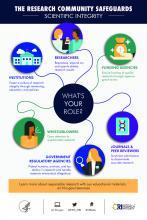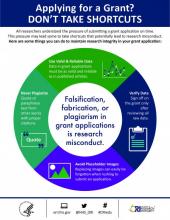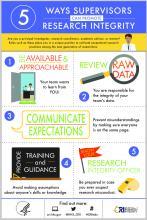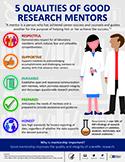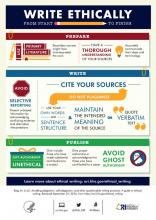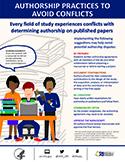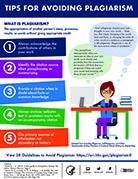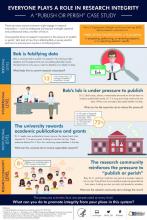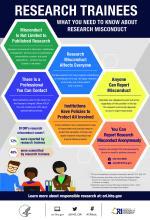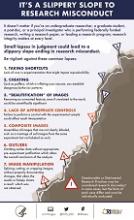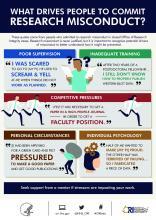The Office of Research at UNL leads in fostering responsibility in the conduct of university research and scholarship, in compliance with federal, state, and university regulations and guidelines. The focus is to be a resource for campus faculty, students, and staff in conducting research-related activities through training and technical expertise. The following are core areas or resources that direct how researchers should conduct research ethically and responsibly.
Collaborative and Interdisciplinary Research and Scholarship
Research increasingly requires significant collaborative effort or team science in order to secure funding and move science forward. As such, researchers must be equipped to identify and effectively address issues that may arise from such endeavors.
Communication is often identified as one of the most important factors in preventing problems among researchers and their collaborators. Best practices for managing or participating in these collaborations includes: setting ground rules early in the collaboration, authorship agreements/avoiding authorship disputes, effective communication across disciplines, the sharing of materials and information with internal and external collaborators, Data Use/Transfer Agreements (DUAs/DTUAs) or Memorandums of Understanding (MOUs) in order to ensure the secure and appropriate sharing of data. Researchers are highly encouraged to create a plan at the onset of their research and re-visit it often throughout the course of their project to maintain and meet goals. Templates are available for many of these areas as linked above in our Data Security, Management, Sharing and Ownership topic.
Conflict of Interest and Commitment
A conflict of interest or commitment is a situation in which a secondary interest/time commitment may improperly influence or bias a primary interest/commitment. In the sponsored research setting, we particularly focus on ways in which personal financial interests or time commitments may improperly influence the design, conduct, or reporting of research. In general, the very first step researchers should complete is submission of an annual disclosure whether or not they have a conflict to report (the disclosure process at UNL is completed via the COI/COC disclosure form in NuRamp. Additionally, researchers must ensure transparent and appropriate disclosure not only to UNL but also to any federal sponsors. The conflict of interest web pages provides a number of resources, information, and policy on how best to navigate these areas.
Data Security, Management, Sharing, and Ownership
Data safeguarding and management are some of the essential areas of the responsible conduct of research. Those involved in research activities at the University of Nebraska-Lincoln (UNL) have certain rights and responsibilities with respect to research data. All data from sponsored or non-sponsored research activities must be recorded, maintained and made accessible in a reasonable and responsible manner by the Principal Investigator (PI) and research personnel and in accordance with all applicable Federal, State, and University requirements.
Research Data and Security webpages, linked above, have been created in order to provide guidance to UNL research personnel regarding research data ownership and the standards for the collection, retention, and destruction of data, in addition to requirements for data access. This also provides guidance with respect to transfer of research data in the event a researcher leaves UNL.
Export controls are designed to ensure that certain information, technology, biological and chemical agents and other sensitive items are secure and not employed or exported outside the U.S. for purposes contrary to national security or U.S. economic interests.
Export controls regulate more than just the shipment of physical goods to foreign countries. They also involve ensuring UNL faculty, staff, and students are knowledgeable about travel to foreign countries where research or institutional information could be inappropriately exported. In addition, export controls regulate sharing information with foreign nationals, even on UNL’s campus. Export Control staff can quickly and easily screen foreign visitors that are planning to visit the campus or assist on possible foreign influence in research scenarios. The export control web pages provide a number of resources, policy, and information on how best to meet these regulations.
Mentor/Mentee Relationships
Mentor and Mentee relationships are integral to the Responsible Conduct of Research (RCR). Research mentoring, the practice where senior researchers train individuals new to a scientific discipline, seeks to preserve the integrity of current and future scientific efforts. The education of novice researchers increases awareness of issues that can compromise the responsible conduct of research throughout one’s career. However, mentors can also benefit greatly from this relationship in better understanding how to advise and pass on responsible research techniques to future scientists.
When teaching future scientists about RCR and mentor/mentee responsibilities, mentors generally should be sure to address: the roles and responsibilities of mentors and mentees, appropriate expectations, conflicts between mentors and mentees, collaboration and competition, selection of a mentor, and misusing the mentor/mentee relationship.
Ideally, the mentoring relationship should benefit the mentee, mentor, university, and science.
Protection of Humans and Animals in Research
Conducting research involving human participants or animal subjects must have approval from either the IRB or the IACUC as appropriate. Both of these regulatory oversight bodies provide a wealth of knowledge, policy, and guidance on their web pages in order to protect humans and animals involved in research.
Publication Practices and Responsible Authorship
The ethical conduct and reporting of research is a vital component for the public trust in and funding of academic research. UNL is committed to providing an environment that supports the research, teaching, and service activities of its faculty, students, and staff. As a matter of principle and practice, the University encourages all members of the University community to publish their articles, books, and other forms of scholarly communication in order to share openly and fully their findings and knowledge with colleagues and the public.
At the same time, the benefits of authorship are accompanied by a number of responsibilities for the proper planning, conduct, analysis, and reporting of research, and acknowledging the content and conclusions of other scholarly work. As members of the academic community, it is the responsibility of UNL faculty, staff, and students to help protect these fundamental elements of the scientific and scholarly process.
The above linked document on responsible authorship is intended to provide guidance, foundational information and a uniform approach to UNL research personnel for responsible research authorship.
Research Misconduct
The multitude of Federal regulations, institutional policies, and guidance information provided to researchers is designed to prevent research from going wrong. Unfortunately, even with all of these rules and information, research can still go wrong. This is where the definition of research misconduct may come into play (fabrication, falsification, or plagiarism). When this occurs at UNL, a specific policy and process must be followed. Please visit the web pages on research misconduct to view the policy, contact information, and resources.
Research Safety
The Office of Research works with the Environmental Health and Safety (EHS) Office to provide administration, training and information to ensure compliance with regulations regarding fire safety, laboratory safety, biological safety, laser safety, and chemical safety. The EHS website details policies and procedures, and provides on-line manuals, instructions and information about training.
Research security is comprised of principles and actions that protect the research enterprise from misappropriation, violations of research integrity, and foreign government interference. Research security benefits us through maintaining trust, protecting economic security, safeguarding data, and nurturing innovation.
Research security is critical to maintaining the integrity, confidentiality, and availability of research outcomes. By ensuring that research efforts remain secure, we can safeguard the future of innovation and protect the competitive advantage of institutions and nations alike. Safeguarding research ensures that it is protected from malicious actors while promoting collaboration, transparency, and ethical standards.
Safe Research Environments
At UNL, we want to create a culture of respect, trust and safety in the research environment for all research personnel and in protecting trainees and learners. Providing an environment conducive to the pursuit of excellence, free of harassment and discrimination, and inclusive of all is an important component of the responsible conduct of research.
The following are some guiding principles that should be at the forefront of how we embody and create a safe research environment:
- Leadership (Encouragement, Communication, Self-Improvement)
- Professionalism (Respect, Integrity, Compliance)
- Equity (Inclusivity, Impartiality, Diversity)
Some examples of incompatible or inappropriate behaviors in creating a safe research environment include:
- Loss of personal civility
- Infringement on autonomy
- Professional & career development abuses
- Discriminatory behavior
- Excessive pressure/unrealistic expectations
Additional Resources
- National Academy of Sciences. Committee on the Conduct of Science. On Being a Scientist: Responsible Conduct in Research, 2nd ed. Washington, DC: National Academy Press, 1995.
- Federal Office of Research Integrity (ORI)
- Online Ethics Center for Engineering and Science
- University of Nebraska Board of Regents Policies & Bylaws
- 2 CFR 200.333 Retention Requirements for Records
- Data Management Planning Tool
- ICMJE Authorship Guidance
- Mentor/Mentee Checklist

